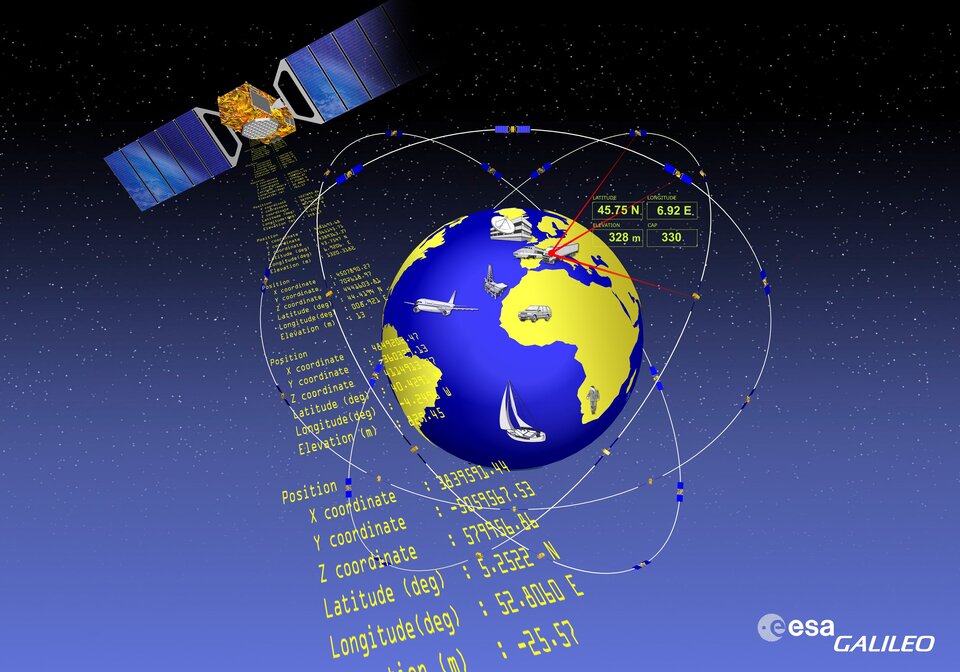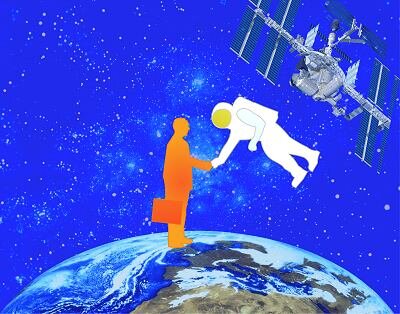Space and daily life
Alastair Evans (16 years old)
Howard of Effingham School
Surrey, U.K.
There are a multitude of man-made moons orbiting our earth. From the perspective of earth orbit, our satellites provide us with a great range of information and functions which are transcending all previous barriers to communication and limits to knowledge. Many of these satellites provide us with real-time information which impacts our daily lives.

Oceanography satellites such as Topex-Poseidon, combined with other similar satellites, provide scientists and weather forecasters with crucial information which allows them to calculate likely weather patterns in the oceans and highlight areas where extreme weather may occur and tracking the weather so necessary precautions can be taken, saving lives and property. Even regular weather-forecasts calculated from data obtained by these satellites are very important for pilots of aeroplanes and captains of ships to ensure they can plan a safe journey. Satellites have brought vast improvement in both accuracy and range of weather forecasts.
The global positioning system, GPS, enables anyone with a receiver to find their location on earth to within mere metres. The benefits of this system, soon to be added to by Europe’s own Galileo system, have been profound in making navigation easier, quicker and more accurate for aeroplanes and ships, and for saving lives in many situations where a person who would have otherwise been quite lost has had a GPS receiver and been able to find their way to safety.

In the field of communication, the use of space has allowed the transformation of earth into a truly global neighbourhood. Television pictures and radio for an entire country can be handled by only one or two satellites. The two fastest-growing and most widely used instruments of communication – mobile telephones and the internet – rely on systems of geostationary satellites orbiting the earth to provide the quick and cheap transfer of their information from sender to recipient. Communicating with relatives and friends on the opposite side of the earth is now as easy as if they lived next door, and almost as cheap!
The development of space exploration has both improved the amount of information we can have, in near-real-time, about the earth, and also provided a fantastic base for scientists to study the earth and the rest of the solar system and universe. Scientists have made countless new discoveries and breakthroughs in the understanding of the biosphere, Earth, as an integrated system, starting with the first American satellite sent into orbit, Explorer One, which detected what is now known as the Van Allen belt in the Earth’s atmosphere.
There are now many thousands of scientists who have utilised the scientific instruments carried on orbiting or interplanetary probes sent into space, and their daily lives and work have been improved and based on the incredible amount of data (and, in some cases, material!) collected by these instruments. Astronomy now enjoys an excellent viewpoint from beyond the earth’s atmosphere where the range and quality of data about other cosmological bodies has increased exponentially, due to satellites such as the Hubble Space Telescope and the Chandra X-ray Observatory. The advancement in scientific knowledge will inevitably lead to secondary developments of technologies designed to improve everyday life on earth. A NASA survey in 1996 claimed there had been about 20,000 secondary applications developed. The benefits to science covers fields as diverse as physics, the earth sciences, chemistry, biology and medicine (for both pharmacological and physiological knowledge) and has already provided new fields of study including astrobiology and astrogeology, at the very beginning of their existence with a whole universe into which to expand.

The economic benefits of space are international and always growing. The design and manufacture of rockets and satellites have given Russia, the USA and many other countries a whole new industry employing thousands of people from the engineers and scientists to the secretaries and businessmen. The space industry is only starting to develop commercially, and as it does, its economic impact is bound to be beneficial to all countries, including those industrially underdeveloped, who recognise and exploit the importance and opportunities to be found in space exploration, development, and even tourism and settlement!

Space contributes to world peace. International co-operation has always been a feature of space exploration, from the Apollo-Soyuz link-up at the height of the cold war, to the formation of a space administration shared by many European countries, ESA, to the most recent and largest endeavour in space development, the International Space Station, a joint operation by Brazil, Canada, the USA, Europe, Russia and Japan. In the history of space exploration and in the foreseeable future, work has been peaceful and international, promoting good relationships between countries. Environmental awareness is encouraged through the unique viewpoint offered by a picture of our precious planet from space, and the realisation of its own special situation as the only planet on which we know intelligent life has ever existed.
The positive impact upon daily life, which these two effects of the exploration of space bring, is significant, but not obviously or materially so like the GPS system. Co-operation between countries leads to mutual understanding and discourages the misunderstanding or jealousy between them that leads to the wars and human catastrophe that is so destructive to life on earth. In a similar way, the perspective into which the earth is put in relation to the universe (the ‘pale blue dot’) has persuaded nearly all who involve themselves with space exploration that the Earth is so small and precious in relation to the size of the universe that war, damaging political disputes, human-created pollution and the over-use of natural resources are shamefully destructive to life and the future of the earth. and their aims are short-sighted and sometimes futile.

The final promise which space exploration holds for us in improving our daily lives lies in the capacity to escape this planet and colonise space. Now we know the dangers posed to life on earth on a large scale, and we have the capacity to create space settlements, space may give us a path to ultimate survival.

